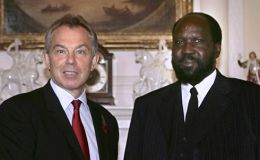Blair warns Sudan close to isolation if Darfur crisis continues
Oct 31, 2006 (LONDON) — British Prime Minister Tony Blair warned Sudan on Tuesday it was nearing the “crunch point” for Khartoum to enforce the peace in Darfur or risk isolation and unspecified action by the international community.
 Blair met Sudanese First Vice-President Salva Kiir in London and told him “everyone must stop fighting and resume dialogue with the people who did not sign up to the peace agreement,” Blair’s spokesman told reporters.
Blair met Sudanese First Vice-President Salva Kiir in London and told him “everyone must stop fighting and resume dialogue with the people who did not sign up to the peace agreement,” Blair’s spokesman told reporters.
“We are reaching the crunch point. It’s important that the Sudanese government be in no doubt at all of our seriousness,” he said at a briefing about the two leaders’ talks.
Blair told Kiir there must be “clear progress” by Nov. 24 when African Union leaders meet to discuss Darfur.
Kiir, a former leader of Sudan’s southern rebels, has publicly disagreed with Sudanese President Omar al Bashir over Bashir’s refusal to accept U.N. peacekeepers, one of the conditions the U.K. government said Sudan must accept.
Earlier this month, Blair urged fellow European leaders to exert “maximum pressure” on Khartoum to ease fighting in the violence-wracked region, where a three-year-old war has left some 200,000 people dead and 2.5 million displaced. Sudan’s government is accused of unleashing brutal militiamen known as janjaweed in the remote western region.
A shaky peace agreement was signed in May by only one of the Darfur rebel factions and the government.
Since then, tension has been rising between Khartoum and the West over a U.S.-British backed U.N. Security Council resolution that calls for the dispatch of 22,500 U.N. troops and police to Darfur.
Khartoum has rejected the deployment of a U.N. force, saying it is an attempt at recolonisation by Western powers and says AU forces alone should have the job of patrolling Darfur. But the 7,000 AU forces in Darfur have been unable to halt the violence.
“The Sudanese government know they face isolation if they do not respond to the will of the international community,” Blair’s spokesman told reporters, but would not be drawn on what that would mean in practice.
“It would be better to let the Sudanese government absorb the message before we talk in public about that,” he said, adding “private messages” were better than public threats at this stage.
Foreign Office minister Kim Howells told Parliament Britain was working to bring “unified pressure” from around the world to bear on the Sudanese government.
“Ministers and senior officials are engaging international partners to ensure that there is a unified pressure on the Sudanese government to accept the U.N. force and agree to a ceasefire and commit to a renewed political settlement with the rebels,” Howells said.
He said Darfur was a test for the United Nations, still grappling with its conscience after failing to act to prevent massacres in the central African nation of Rwanda and in Bosnia.
“The world needs from the United Nations an example of how it can act in very difficult circumstances to rescue huge numbers of people from the most dreadful fate that they’re suffering at the moment,” Howells said.
(AP/Reuters)
